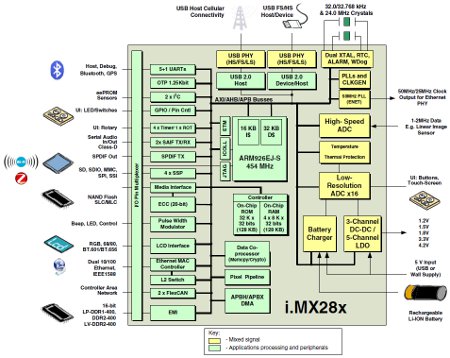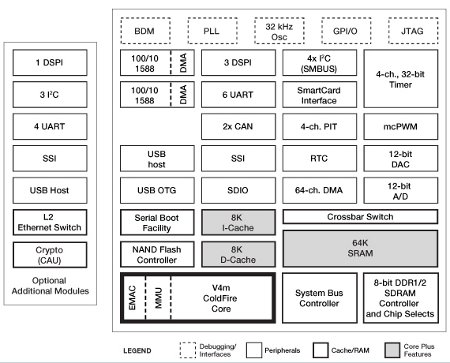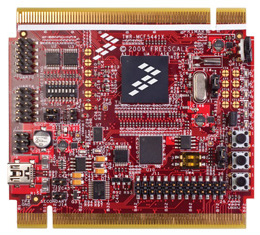Linux-ready SoCs sip half a Watt
Sep 27, 2010 — by Eric Brown — from the LinuxDevices Archive — 54 viewsFreescale Semiconductor announced a Linux-ready, ARM9-based i.MX28x SoC and a Coldfire-based MCF5441x MCU, both targeting fanless industrial applications as well as automotive systems. The i.MX28x and MCF5441x each consume less than half a Watt, support extended temperatures, offer clock synchronized Ethernet, and with some models, include a Layer 2 switch for low-cost daisy-chaining of devices.
The i.MX28x and MCF5441x are aimed at low-power applications, including appliances, portable and diagnostic medical devices, energy distribution equipment, meters, human machine interfaces (HMIs), motor control, and industrial controllers, says Freescale. The MCF5441x provides customer benefits tailored for motor control, while the i.MX28x is oriented more at display applications, says the company.
The i.MX28x turns out to be the "mystery SoC" we reported on last week when Freescale announced its Home Energy Gateway (HEG) "smart grid" reference platform. In fact, the SoC is said to focus in general on "gateway products that bridge multiple networks," says Freescale.
The i.MX28x and MCF5441x are each said to run on 0.5 Watts and support temperatures of -40 to 185 deg. C (-40 to 85 deg. C).
The two system-on-chip (SoC) familes also both offer at least one model with a new embedded three-port Layer 2 switch claimed to replace up to $4 of external component cost. According to Freescale, this switch is particularly useful for devices such as elevator and assembly line controllers, which can use it daisy-chain between Ethernet-connected nodes, thereby eliminating the need for costly network equipment and cables.
Other shared features include 10/100 Ethernet ports that contain IEEE 1588 hardware timestamp support for clock synchronization of networked devices, says the company. Peripheral support is said to be somewhat similar, with I/O including multiple UARTs, controller area network (CAN) controllers, and USB interfaces.
i.MX28x
The 454MHz i.MX28 joins the ARM9 branch of Freescale's i.MX family of SoCs, including two other industrial-focused SoCs mentioned as alternative SoC choices for the aforementioned Freescale HEG. These would be the 400MHz i.MX258, and the 454MHz i.MX233, which is touted for its mixed-signal technology.

i.MX28x block diagram
(Click to enlarge)
- i.MX281 — Base-level automotive-focused version, featuring dual CAN interfaces
- i.MX283 — Base-level consumer/industrial model
- i.MX285 — High-end automotive SoC with dual CAN interfaces and an LCD touchscreen controller
- i.MX286 — Mid-level consumer/industrial model with dual CAN interfaces
- i.MX287 — High-level consumer/industrial model with dual CAN interfaces, dual Ethernet ports, and an L2 switch
Built around an ARM9 core clocked to 454MHz, the i.MX28x delivers 500 MIPS performance, says Freescale. All five versions are equipped with 128KB of SRAM and 16KB/32KB I/O caches, and are offered in a 289-pin ball grid array (BGA), says the company. External memory support is said to be offered for DDR2, LPDDR, LV-DDR2, and NAND flash.
The i.MX28x offers an integrated power management unit, with support for Li-Ion batteries, designed to power sequence the device, as well as external components in the system, says Freescale. Low-power modes for low standby current and secure boot are also said to be available.
Each processor is equipped with an LCD controller with touchscreen capability, says Freescale. In addition, all the models are said to offer up to an 8-channel A/D converter (DAC) and single-channel ADC supporting a 2Mbps data rate, says Freescale. A temperature sensor is also said to be standard.
As noted, the standard 10/100Mbps Ethernet port (or dual ports in the case of the i.MX287) is said to comply with the IEEE 1588 clock synchronization standard.
Although full datasheets are available only on the consumer/industrial models, not the automotive i.MX281 and i.MX285, it appears that the i.MX287 may be the only model to offer the aforementioned L2 switch, which is said to "address specific needs for industrial applications."
Once again leaving out the automotive versions, additional I/O for the i.MX283, i.MX286, and i.MX287 include USB 2.0 Host and OTG ports with PHY, as well as six UARTS, eight PWM interfaces, and a "security" function.
All the devices offer SDIO and SPI interfaces, with three of each for the i.MX283/i.MX286 and four for the i.MX287. Except for the i.MX283, they also offer dual CAN interfaces and S/PDIF Tx connectivity, says the company.
Full AEC-Q100 automotive qualification is cited, although it's unclear whether this refers only to the two automotive models.
Freescale offers an i.MX28 evaluation kit (MCIMX28EVK), plus multimedia codecs and board support packages (BSPs) for Linux and Windows CE, says Freescale. As part of the i.MX family of ARM SoCs, the processors are also supported by numerous third-party integrated development environments (IDEs), tool chains, industrial network protocols, and additional operating systems, as well as development boards and modules, says the company.
i.MX28x Android support and a community "SwiftBoard"
As noted in the following testimonial quote, AllGo Systems plans to offer Android support for the i.MX28x. Stated K. Srinivasan, CEO, AllGo Systems, "The i.MX28 family of processors is a great follow-on series to the popular i.MX23 and i.MX25 family from Freescale. The integration of power management, dual USB ports, Ethernet and LCD controller make this a very interesting platform for consumer and industrial markets. AllGo plans to port Android to i.MX28 as well as offer our Smart Home Energy Gateway software on top of i.MX283 running Linux."
Innovate Software Solutions Pvt Ltd., meanwhile, announced a $149, community-backed "Swiftboard" development board for Linux and Windows CE based on the i.MX28x. Said to be "coming soon," the SwiftBoard is an "open," community-driven platform similar to the company's recent Texas Instruments OMAP-L138 based HawkBoard.
The Swiftboard enables users to create applications such as portable medical applications and test and measurement systems with advanced HMI support, says Innovate Software Solutions.
The SwiftBoard uses a 3.94 x 4.72-inch (10 x 12cm) form-factor enabled with "multiple expansion and interface options, says the company. The board is said to support a 3G module, SDIO based Wi-Fi and Bluetooth, RS-485, a keypad, and a 4.3-inch TFT/LCD touchscreen. (For more details, see link at end of article and look for future coverage on LinuxDevices when the board ships.)
Stated Yannick Chammings, CEO of Adeneo Embedded, which is supporting the Freescale HEG with Linux and Windows Embedded CE BSPs, "Adeneo Embedded is very excited to extend its collaboration with Freescale Semiconductor to the new i.MX28 processor, through our support to device makers in the integration of Windows Embedded CE and Embedded Linux on i.MX based architectures."
MCF5441x
The MCF5441x ColdFire SoC builds upon earlier uClinux-ready, Coldfire architecture micro-controller unit (MCU) processors such as the MC532x. Whereas the latter, for example, used a 68K/Coldfire V3 core clocked at 240MHz, the new version integrates a ColdFire V4 core, which is generally clocked at 345MHz and offers a claimed 1.54 DMIPS/MHz.

MCF5441x block diagram
(Click to enlarge)
Additional I/O includes up to two SPI, one SSI, two IC2, six PWM, one eSDHC, one CAN, and five UARTs, says the company.
Analog features are said to include high-speed precision pulse width modulators, as well as dual high-speed, 12-bit DAC/ADCs.
The MCF5441x is supported with a Linux BSP, as well as Freescale's complimentary MQX 3.6 real-time operating system (RTOS). Support software is said to include CodeSourcery's Eclipse-based CodeWarrior 10.0 IDE.

TWR-MCF5441X 32-bit MPU module
Stated Bruno Baylac, Freescale's director of global industrial segment marketing, "With all features running at maximum performance, the i.MX28x and MCF5441x families consume less than half a watt of power across the industrial temperature range of -40C to +85C. These highly integrated devices give design engineers a low-cost, ultra-low-power solution for a broad range of industrial designs."
Support testimonials for the i.MX28x and/or MCF5441x include quotes from AllGo and Adeneo (see farther above), as well as Innovate Software Solutions, CodeSourcery, IXXAT, Karo Electronics, and Lauterbach.
Availability
Evaluation and demonstration systems for the i.MX28x and MCF5441x family are available now, says Freescale. Suggested resale pricing for the i.MX28x starts at $5.27 in 10,000-unit quantities, and the MCIMX28EVK evaluation kit is available at a suggested resale price of $399, with an optional LCD module add-on for $199.
More information on Freescale's i.MX28x may be found here.
More on the Innovate Software Solutions i.MX28x-based Swiftboard may be found here.
Freescale's MCF5441x ColdFire family suggested resale pricing starts at $4.99 in 10,000-unit quantities. Evaluation and demonstration systems for the family are available now. A TWR-MCF5441X 32-bit MPU module is available for $139, and the TWR-MCF5441X-KIT is available at a suggested resale price of $259.
More information on Freescale's MCF5441x may be found here. More on the TWR-MCF5441X tower module may be found here.
The MCF5441x and i.MX28x devices are part of the Freescale Product Longevity program, with 15 years of assured supply, says the company.
This article was originally published on LinuxDevices.com and has been donated to the open source community by QuinStreet Inc. Please visit LinuxToday.com for up-to-date news and articles about Linux and open source.